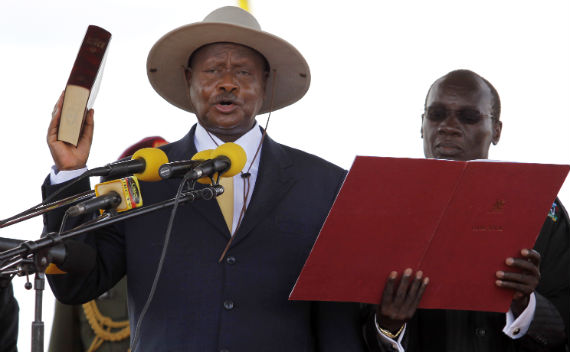More on:

Uganda’s walk-to-work demonstrations against the Museveni regime generated international attention and sympathy last April. The brutal police crackdown recalled the early days of the “Arab Spring” above the Sahara, and some questioned whether Yoweri Museveni—Uganda’s president for over twenty-five years—could hold on to power. Activists for Change, a Ugandan opposition movement, will resume demonstrations during August.
The April protests were ignited, in part, by a spike in food and fuel prices. Now, however, new figures from the Uganda Bureau of Statistics suggest that the inflation rate, though still the highest in years, stabilized last month. (The overall rate was 15.8 percent, down from 16 percent the previous month; the food inflation rate was 39 percent, down from 44.2 percent.)
While high prices continue to be a serious short term challenge in Uganda, over the long term “inflationary patronage” could undermine Museveni’s position. Joel D. Barkan describes the term as the unending increase in the amount of money and related corruption needed to maintain Museveni’s many patron-client relationships. As another expert notes in a new article, Museveni spent one third of the entire state budget—or $1.3 billion—during the single month of January 2011, when Ugandans went to the polls in national elections that Museveni won. The election may have been Uganda’s single most expensive event since independence in 1962. Museveni also spent at least $720 million to buy six Russian Sukhoi fighter jets—a purchase that Emmanuel Tumusiime-Mutebile, the governor of Uganda’s central bank, openly criticized in a recent interview with the Financial Times.
While other African leaders use revenue from oil or even foreign development assistance to fund their ever expanding patronage systems, Museveni may not be so lucky. The 2.3 billion barrels of proven reserves in the Lake Albert region of northwestern Uganda will not come online for at least several years. The World Bank is unlikely to finance the necessary pipeline from the oil fields to Kenyan ports. Overseas direct assistance has also started to wane, with donors understandably concerned about the rule of law and state of democracy. Museveni has proven his political shrewdness over the last three decades, and there has been a tendency to view him as the archetypal Big Man—one who gains power with age. To be sure, Museveni will not leave office any time soon, and his ability to win 68 percent of the vote during the 2011 elections proves his staying power. However, Ugandan patronage politics may prove unsustainable over the next few years.
h/t to Charlie Warren
More on: